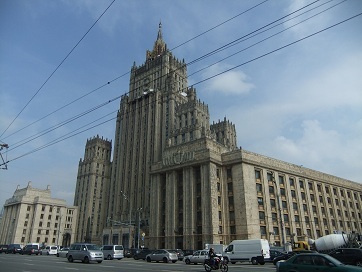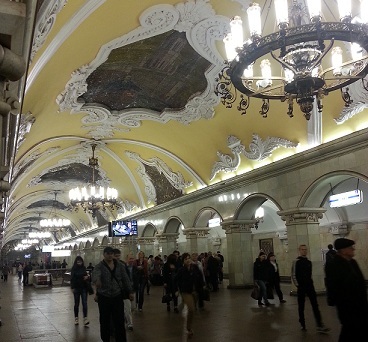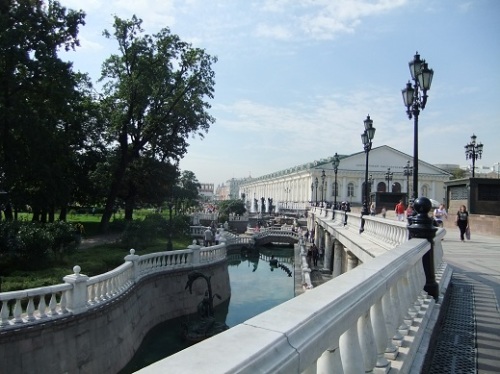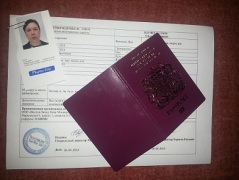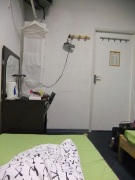

On the corner of Ascension Lane, a few minutes walk from Red Square, there is a church that looks like its here as a holidaymaker from leafy English suburbia, and probably still has a few tins of beans in its luggage. Its wearing a jaunty green roof as a bit of holiday jollity, but it draws the line at these flighty domes the locals go in for.
Only when you look closely do you see hints which stand as a reminder that this church is not a temporary interloper, but shares in the troubled history of the Church in Russia:

This bullet hole is from when the Bolsheviks occupied the tower and used it as a gun emplacement in 1917

and this interior was until recently split into different recording studios, used by the Soviet recording company Melodia. As you can see, the windows still have soundproof glass bricks instead of stained glass.
This is St Andrews, a little piece of the Church of England in Russia.
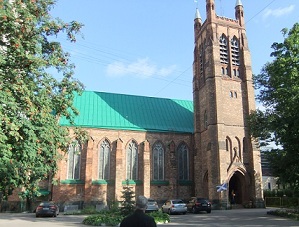
Yes, England (although the name and the saltire are a reminder that Scots were involved in its building). There is no separate Anglican province for Europe. Rather, in a way which neatly sums up a certain British attitude to the continent, Europe is a diocese of England. Same rules, same liturgy, same architecture but at the same time completely the opposite. The Church of England is by definition the church by law established. But English law doesnt apply here. So the Church of England outside England is, in a funny sense, not really the Church of England at all. Were used to being the default option, legally and culturally there for everybody whether they want us or not. Here in culturally-Orthodox Russia, were a chaplaincy, with a strictly limited remit: as the slogan puts it, Serving the international community for Christ.
Just as Moscow is full of international schools, offering an English curriculum to American and Russian pupils, so St Andrews is the international church. Here, a congregation from every continent can get their weekly dose of BCP, prayers for the Queen, and coffee-after-church. The great event whilst I was there was the Village Fete for the church roof fund, of course where Russians could learn the concept of tombola and homesick English folk could eat a nostalgic cream tea. The Russian notion of a scone was sometimes rather approximate in terms of shape, content and consistency, and the cream was technically smetana (crème fraiche, roughly) but the whole thing was unmistakeably an English church fete and, like pretty much everything else in Moscow, reminded me of my 1980s childhood. Although I doubt that many church fetes in England are opened by a deputy ambassador.
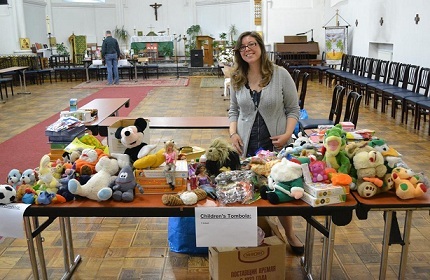
In one sense, St Andrews is the epitome of city centre ministry. The worshippers gather from up to three hours away, an educated and multicultural congregation of diplomats, foreign correspondents, business people and teachers. It is so diverse that it took me a little while to realise one group of people ubiquitous in English parishes was missing: pensioners. Expats come to Moscow to work, for a year or a few years, and then they go home or move on. Unless you marry a Russian and get permanent residence that way, this is literally no country for old men.
But in another way, the chaplaincy is very much the parish church albeit that the parish stretches from St Petersburg to Vladivostock, with occasional pastoral visiting in Kyrgyzstan. The chaplain has pastoral care of the Anglican community in Siberia (there is one – one Anglican, that is) and attends archdeaconry synod meetings as far afield as Athens. Just like the village church, this is the hub of a community – quite a number of people who brave the metro every weekend to get here didnt bother much with church back home.


And there is even a certain type of worship that I always associate with village churches, a sort of broad central tradition, slightly patched together, with something for everyone and nothing too new-fangled or too catholic or too much of anything. Its the worship that happens when theres only one church in town and people of different traditions are thrown together.
Well, if youre an Anglican in Moscow, church shopping to the neighbouring parish would mean a 500-mile-plus journey to Kiev or Riga. I dont think I have ever before heard the whole range of Anglican languages, from Evangelical to Anglo-Catholic, Canadian to Nigerian, being spoken within one congregation. And somehow, mostly, it works. For most of these people, this isnt a permanent home, somewhere they feel they have a right over but it is a home from home, and valued all the more for that. It is precious to them, but they arent precious about it. It was the whole Anglican communion in one room, and that gives me hope.


